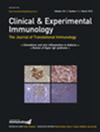基因组检测发现极早期炎症性肠病患者的单基因病因:伊朗队列中的多中心调查
IF 3.4
3区 医学
Q3 IMMUNOLOGY
引用次数: 0
摘要
极早发炎症性肠病(VEO-IBD)患者可能因潜在的单基因先天性免疫错误(IEI)而发病。据观察,不同种族人群的单基因 IBD 病因存在很大差异。这项多中心研究针对 16 名伊朗 VEO-IBD 患者展开。我们回顾了临床和基础免疫学评估,包括流式细胞术和免疫球蛋白水平。所有患者都进行了临床全外显子组测序(WES)。16名患者(8女8男)的中位年龄为43.5个月。发病时的中位年龄为 4 个月。大多数患者(12 人,75%)的父母是近亲。慢性非血性腹泻(13 例,81.3%)和肛周疾病(包括肛周脓肿(6 例,37.5%)、肛裂(6 例,37.5%)或肛瘘(2 例,12.5%))是最常见的表现。WES 在 13 名患者(81.3%)中发现了一系列基因变异:IL10RB(6 例,占 37.5%)、MVK(3 例,占 18.8%),以及 CASP8、SLC35C1、G6PC3 和 IKBKB(1 例)。3名患者(18.7%)未发现变异。流式细胞术发现了一系列异常,有助于评估基因诊断的证据。调查结束时,3 名患者(18.8%)已经死亡。这种具有广泛基因谱的单基因缺陷率很高,这重申了在婴儿期发病的 IBD 患者中调查 IEI 的重要性。本文章由计算机程序翻译,如有差异,请以英文原文为准。
Genomic Testing Identifies Monogenic Causes in Patients with Very Early-Onset Inflammatory Bowel Disease: A Multi-center Survey in an Iranian Cohort.
Patients with very early-onset inflammatory bowel disease (VEO-IBD) may present because of underlying monogenic inborn errors of immunity (IEI). Strong differences have been observed in the causes of monogenic IBD among ethnic populations. This multi-center study was carried out on 16 Iranian patients with VEO-IBD. We reviewed clinical and basic immunologic evaluation including flow cytometry and immunoglobulin levels. All patients underwent clinical whole exome sequencing (WES). Sixteen patients (8 females and 8 males) with a median age of 43.5 months were enrolled. The median age at the onset of symptoms was 4 months. Most patients (12, 75%) had consanguineous parents. Chronic non-bloody diarrhea (13, 81.3%) and perianal diseases including perianal abscess (6, 37.5%), anal fissure (6, 37.5%), or anal fistula (2, 12.5%) were the most common manifestations. WES identified a spectrum of genetic variants in 13 patients (81.3%): IL10RB (6, 37.5%), MVK (3, 18.8%), and CASP8, SLC35C1, G6PC3, and IKBKB in one patient, respectively. In 3 patients (18.7%) no variant was identified. Flow cytometry identified a spectrum of abnormalities that helped to assess the evidence of genetic diagnosis. At the end of the survey, 3 (18.8%) patients were deceased. This high rate of monogenic defects with a broad spectrum of genes reiterates the importance of investigating IEI in patients with infantile-onset IBD.
求助全文
通过发布文献求助,成功后即可免费获取论文全文。
去求助
来源期刊
CiteScore
8.40
自引率
2.20%
发文量
101
审稿时长
3-8 weeks
期刊介绍:
Clinical & Experimental Immunology (established in 1966) is an authoritative international journal publishing high-quality research studies in translational and clinical immunology that have the potential to transform our understanding of the immunopathology of human disease and/or change clinical practice.
The journal is focused on translational and clinical immunology and is among the foremost journals in this field, attracting high-quality papers from across the world. Translation is viewed as a process of applying ideas, insights and discoveries generated through scientific studies to the treatment, prevention or diagnosis of human disease. Clinical immunology has evolved as a field to encompass the application of state-of-the-art technologies such as next-generation sequencing, metagenomics and high-dimensional phenotyping to understand mechanisms that govern the outcomes of clinical trials.

 求助内容:
求助内容: 应助结果提醒方式:
应助结果提醒方式:


